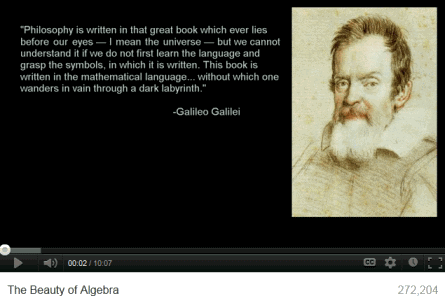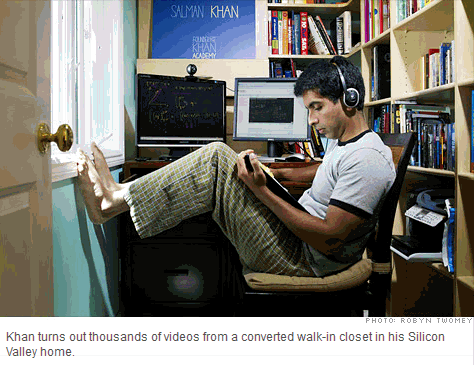
|
Editorial
- 30 April 2012 |
|
|
An Educational Pioneer Makes Time's 100 Most Influential |
Salman Khan and Bill Gates at TED. Click to watch Khan
explain the workings of the Khan Academy March 9, 2011
Over 3100 videos provide A free world-class education for anyone anywhere -- 142,634,063 lessons delivered -- so far. This we are told when entering the website of the Khan Academy.
As of March 2012, the Khan Academy channel on YouTube has attracted more than 300,000 subscribers.
_______________________________________
In 2004 the 28-year-old MIT and Harvard graduate* hedge fund analyst took up the challenging task of tutoring his cousins in mathematics over the internet using Yahoo!'s Doodle notepad.
Over the next 5-years the number of short (10-15 minute) tutorials grew and grew and grew; the Khan Academy's following / pupils had assumed world-wide proportions, and 2009 saw Salman Khan, the New Orleans born son of an Indian mother and Bangladeshi father, quit his day job to devote full time to the not-for-profit Khan Academy.
By 2010 the Khan Academy had come to the attention of Bill
Gates: "This guy is amazing. It is awesome how much he has done with very little in the way of resources," and at the July
2010 Aspen Ideas Festival Bill Gates praised the Khan tutorials: "Unbelievable,
I've been using [them] with my kids... [this guy] was a hedge fund guy making
lots of money. I'd say we've moved about 160 IQ points from the hedge fund
category to the teaching-many-people-in-a-leveraged-way category. It was a good
day his wife let him quit his job."
how much he has done with very little in the way of resources," and at the July
2010 Aspen Ideas Festival Bill Gates praised the Khan tutorials: "Unbelievable,
I've been using [them] with my kids... [this guy] was a hedge fund guy making
lots of money. I'd say we've moved about 160 IQ points from the hedge fund
category to the teaching-many-people-in-a-leveraged-way category. It was a good
day his wife let him quit his job."
In March 2011, Salman Khan was invited by Bill Gates to speak at TED (see above)
And click the image on the right for an example of a 10 minute Khan tutorial introducing algebra.
When Khan was asked how he had found the time to make so many video tutorials he indicated guilt played a part: "My wife was doing her residency in internal medicine, from 2005 to 2008, so there were many nights and weekends where she was working and I would have felt guilty doing anything less productive."
Perhaps not surprisingly not everyone is enamoured with the Khan Academy. Jeffrey Leeds, president of Leeds Equity Partners, the largest U.S. private equity firm specializing in for-profit education told CNN Money: "It's a solid supplemental resource, particularly for motivated students, but it's not an academy -- it's more of a library." But click on the top graphic to realise Mr Leeds' lack of understanding of the design of the Khan Academy.
On the other hand Bill Gates in his write-up for Time's world's 100 most influential people wrote: "Early pilot programs in California classrooms show terrific promise. I've used Khan Academy with my kids, and I'm amazed at the breadth of Sal's subject expertise and his ability to make complicated topics understandable. Sal Khan is a true education pioneer. He started by posting a math lesson [a tutorial for his cousins], but his impact on education might truly be incalculable."
Sal Kahn has his sights set on "tens of thousands" of tutorials as the basis for the "first free, world-class virtual school where anyone can learn anything." And already in 2010, Google provided $2 million to support the creation of more tutorials and funding to enable the Khan Academy to translate its core library into the world's most widely spoken languages.
Finally, Soraya Auer in her article in Bangladesh's The Daily Star writes: "When asked if he would ever be interested in turning Khan Academy into a business, he said, 'I've been approached several times, but it just didn't feel right. When I'm 80, I want to feel that I helped give access to a world-class education to billions of students around the world. I already have a beautiful wife, a hilarious son, two Hondas and a decent house. What else does a man need?"
So is it an irrelevancy to ask: "All things considered, whom will history judge more beneficially influential, Sal Khan or Rupert Murdoch?"

_____________________________________________
*MIT degrees in mathematics, electrical engineering and computer science (BS, MS); Harvard MBA
Alex Reisner
The Funneled Web